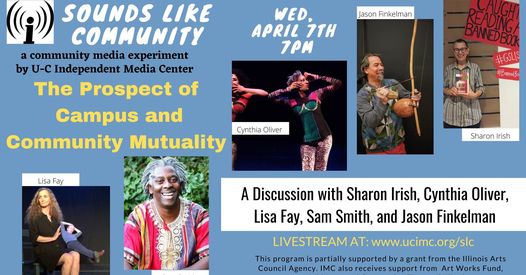
In preparation for Sounds Like Community, an online event that the Urbana-Champaign Independent Media Center has been organizing ever since the pandemic started over a year ago, I thought I would (re)post these lists of Tips and Tricks that were collaboratively generated in 2014 when I had a fellowship at the University of Bristol in the UK. My amazing collaborators at the Knowle West Media Centre suggested that I interview a number of women activists and distill their wisdom into a brief document that could inform future work among campuses and communities that host them. In an ongoing effort to figure out effective collaborations across communities, I created another list in the 2010s which I have included below the Tips and Tricks.
Here are the lists:
20 TIPS & TRICKS FOR COMMUNITY ACTIVISTS*
- Believe in yourself
- Speak from your heart
- Focus on your goal, not your ego
- Community change is not a sprint
- Expect the unexpected
- Emotions and bodily responses are part of the work
- Truth is not the same for everyone
- Varied perspectives are crucial: listen and look closely
- Don’t wait for the money
- ‘Experts on tap, not on top’
- Be dogged, but not inflexible
- Avoid politics and religion if they slow you down
- If you don’t ask, you don’t find out
- Tell stories with images and/or words
- When you put your head above the parapet, be ready for attacks
- Having a physical location matters
- Work across generations
- Sometimes you must make your own rules
- Thank your friends and family
- Renew: breathe, laugh, sleep, exercise
20 TIPS & TRICKS FOR ACADEMICS WORKING WITH COMMUNITY ACTIVISTS
- Accept and use your privilege
- Ask how you can help and then do it
- Your assistance may not look academic
- Theory may be off-putting
- Creatively direct funds to community activists
- You will make mistakes: be humble
- The academy will not praise your engaged scholarship
- Be transparent about your goals, your funding, your findings
- Remember: activists raise families and work paid jobs too
- Co-present with your activist partner
- Provide support for child care, travel, food, lost wages
- Be prepared to act quickly
- Find ways to make the bureaucracy work for you
- Following the money may undermine your goals
- When grant funding ends, the work does not
- Document and archive
- Remember that academic life is marginal to many people
- Work across generations
- Thank your friends and family
- Renew: breathe, laugh, sleep, exercise
*Created with the Knowle West Media Centre, Bristol, UK, http://kwmc.org.uk/ together with the Productive Margins Programme at the University of Bristol, http://www.productivemargins.ac.uk/partners/
CROSSING THE DIVIDES, DELIVERING THE GOODS
CHECKLIST FOR COMMUNITY-UNIVERSITY PROJECTS, assuming an approach of a reciprocal relationship where the potential partner(s) decide what’s important and how it is to be accomplished.
CROSSING THE DIVIDES, DELIVERING THE GOODS
Checklist for Community-University Projects
Draft by Sharon Irish, January 2008; revised October 2018
General
Is there a clear and galvanizing idea/issue? Is it generally understood in the same ways by everyone?
Who is not at the table? Why? Are there too many/too few people involved?
What are the motivations for seeking a partnership?
Is there a process in place or in development for coalition building? Conflict management? (Partners must spend time together to foster mutual trust, eg)
Is there enough time to accomplish the goals?
What are the existing and potential funding sources? How will resources be shared?
Does each project have a process for documentation? Assessment?
Have ethical and self-reflecting processes been established? Who is responsible for what?
Are there/will there be opportunities for periodic reviews of these processes?
Is there a timeline or work plan with deadlines?
How will projects that have ended be presented? Maintained or renewed?
In the end, will the project be mutually beneficial, to the best of our knowledge?
Potential Community Partners
Are the community partners sufficiently established? What level of commitment to the project is evident? (How many people are on board?)
What is their track record of accomplishment in collaborative work? (evidence of administrative support? Inclusive processes? Length of commitment? Infrastructural support?)
Is their process transparent? (No overt effort to shut out a particular group.)
What will they get out of the project? Who is included in the outcomes?
Potential University Partners
What roles are there for students? Staff? Will there be training, if necessary? Who will conduct it?
Do participants have relevant skills/languages/cultural competencies?
What supervision will students receive?
What might the research possibilities be and how might they be advanced?
Are there faculty or staff members who have the appropriate interests/expertise?
Do the relevant people have sufficient time to get involved with integrity?
Is a collaboration/partnership the best way to accomplish the goal(s) of (most) of those involved? (The UIUC emphasis on “deliverables” and research publications may not serve every project well, for example. There are very real clashes of institutional values/priorities/structures.)
Decisions
What are the goals of these partnerships? Whose goals are they?
- Research publications?
- Theoretical and/or methodological models?
- Systemic change within the UIUC?
- Capacity building and social justice on campus and off?
- Long-term involvement with one or a few groups?
- Teaching students?
- Some combination of the above?

